- Home
- Michelle E Lowe
Bounty Hunter
Bounty Hunter Read online
Legacy
Bounty Hunter
Michelle E. Lowe
Copyright
Legacy-Bounty Hunter Copyright © Michelle E. Lowe 2018
This is a work of creative fiction. Names, characters, places, events and incidents are either the products of the author’s imagination or used in a fictitious manner. Any resemblance to real persons, living, dead or immortal is purely coincidental.
Michelle E. Lowe asserts her moral right to be identified as the author of this book.
All rights reserved. This book, or any portion thereof may not be reproduced or used in any manner whatsoever without the express written permission of the author, except for the use of brief quotations in a book review.
Any copyrighted material is reproduced under the fair use doctrine.
ISBN: 9781791326265
ACKNOWLEDGMENTS
I would like to thank those who have helped the Legacy series along on its journey. First, I’d like to thank my daughters, Mia and Kirsten, who keep encouraging me to tell stories, and to my dad, Jim, and Aunt JoAnn for always being there. Special thanks to my husband, Ben Deda, for your support.
Thanks to Alejandro Lee, Claire Casey, Freddy Gutierrez, Yvette Bostic, MontiLee Stormer, Michael Arnold, Michael Baker, Jonathan Fesmire, Jonathan Rose, Jessica Ellis, Kelly Evens, Dara Crawley, Mad Wilson, and William Bitner for their assistance and advice. Thanks to Amy Coughlin, Elena Lange, Elisa Jiang, Evan Pitman, Heather Pitman, Oliver Bagley, Ruth Daly, Glenn Ramos, Scott Carol, Kimberley Luce, Jonathan Fesmire, Landry Prichard, TaunjiHurlbut, Erin Mulligan, Amber Heyman, Russell Hinson, John Cook, and Tom and Jennifer Allard for their time and generous support. Thanks to my editor, KH Koehler, for your hard work.
Although they’re no longer here, I’d like to thank my mother, Janice, and my brother, Jimmy. Missyou both so very much. And a huge thanks and heaps of gratitude to my mentor, Catherine Rudy.
Legacy
Bounty Hunter
(Book Four)
“No one knows how they obtained their powers. Some speculated that they came from another plane of existence, perhaps one that no longer exists. One in which they may have destroyed themselves. They were destructive creatures and were in need of a new home. They found it there, where they declared themselves gods. . .”
—The Teller of Forgotten Tales
Finding a Place to Call Home
Off the Shores of England,
Summer, 1652
Only when the coarse grains of sand touched his lips, did the boy feel safe again.
Joaquin’s travels had led him nonstop from Teruel, Spain, and then through France. He snuck aboard a ferryboat in Calais to cross over into England. An abrupt storm had nearly brought the vessel down. The boat landed miles from Dover, but it anchored nonetheless.
When Joaquin’s feet touched the shore, he dropped to his knees, cupped sand in his hands, and kissed it.
Reluctant to travel by sea any longer, the twelve-year-old set off inland. Joaquin ventured for many lengths on foot, taking in the beauty of this new country.
On the night he ran away from the Esperanza y Milagros orphanage, he had journeyed until morning. He had found the freedom invigorating. His first experience being on his own changed him. He was no longer the little boy trapped behind the walls of abandoned children. He had set himself free in the big wide world, and he wanted nothing more than to continue moving in it.
In England, he hitched rides or traveled on foot, feeding off muskrats he was able to hunt or chicken eggs he stole from chicken coops. Joaquin roamed aimlessly through the countryside. The orphanage was full of short-tempered nuns who had demanded absolute obeisance. Out here, though, he could scream, laugh, dance, and even play his violin whenever he pleased. The violin had prompted Joaquin to believe that his parents were musicians.
The man who’d brought him to the orphanage when Joaquin was still only a newborn had left the stringed instrument. Sister Paula, the nun who had answered the door that night, described him only as being a handsome young gringo that spoke Spanish.
Joaquin often asked himself if the gringo had been his father, and he had always hoped that someday the man would come back for him. He also wondered why the man had abandoned him at the orphanage. Had Joaquin’s mother died while giving birth, and his father refused to raise a child alone? Or, had it been his own mother who’d given him up? Such questions used to anger him because no one could answer them. Unlike the other orphaned children, no note had been left for Joaquin. To keep these answerless questions from tearing him apart, he put his woes into his music.
He practiced every chance he got, which wasn’t often inside the orphanage unless he performed for the nuns. He played songs like Jesu, corona Virginum or other religious hymns. Yet, despite the limited time he was given, he played remarkably well. In fact, he even caused those bad-tempered women to weep. How had he orchestrated music so elegantly at such a young age with minimal practice? No one knew. The nuns believed it was a gift from God.
His only belongings were comprised of the violin and the clothes he wore. During the choppy journey across the English Channel, the instrument had been damaged. The tailpiece had cracked, snapping a string. Before it broke, he had done what the British called “busking” to earn money in the towns he passed. Even so, the damage hadn’t prevented him from playing when alone. The music helped him cope with his loneliness. By leaving, Joaquin had won his freedom, but it also left him unaided, especially during the night.
He wished for a family.
At dusk, Joaquin made camp underneath an ancient arched bridge. Joaquin had learned to build a fire by using a bow drill he had made from the broken string of his violin.
Rain was falling by the time he got the fire going. He brought out the instrument. The soothing melody kept his mind off his hunger. He became lost in the harmonious sounds coming from the strings, and the humming by his ear took him to a wondrous world of magic and life.
As he sank into this pleasant region, a voice said, “¿Puedo unirme a ustedes?”
Joaquin jumped right out of his fantasy and back into reality. His heart felt like it had stopped when he saw a woman standing under the edge of the bridge. She was dressed in a dark green cape with a black scarf wrapped around her neck. Her pale face glowed, and her lengthy, curly hair fell past her waist.
She seemed untouched by the downpour.
She repeated her request to join him.
“Um . . . um . . .” he mumbled, unable to thread together a complete sentence.
“Gracias,” she said, thanking him regardless and approached the campfire.
The rain fell harder, pounding the ground and cascading down into the rising brook beneath the arched overpass.
She sat on her haunches by the flame and folded her hands over her lap. “What a lovely fire you have built.”
She didn’t look Spanish, but she spoke the language.
When he kept silent, she tilted her head sideways.
“Are you a mute?”
Joaquin strained to recover from the shock of her presence.
He cleared his throat. “No. I speak. I . . . I just wasn’t expecting company.”
“I’m surprised, considering this welcoming fire.” She raised her hands to it. “It warms you up rather nicely.”
It seemed strange to him how dry she was. Even if she had a parasol—which she obviously did not—there still would’ve been a few droplets on her.
Where did she come from? Why was she here?
The lady reached into a sack that had suddenly appeared. “You look hungry.”
His questions vanished the moment she brought out bread with cuts of meat and cheese wedged in between them. She handed him the food.
“Her
e you go.”
“Muchas gracias!” he exclaimed, accepting it.
He could not eat it fast enough. The taste danced over his tongue better than anything he’d had before. Everything from the tender meat to the creamy goat cheese and sesame seeds embedded in the soft, sweet bread seemed as if the best baker, butcher, and cheese maker who had ever lived had prepared it.
It was the most he’d eaten in one sitting. The orphanage had always served just enough to keep bellies half-full and not a scrap more. Finding food on his own hadn’t been like dining at a banquet, either. With such a small stomach, it surprised him that he was able to eat the entire sandwich.
“My, my,” the woman observed, “you were hungry. Drink this.”
From a bottle, she poured red liquid into a cup. More items that just seemed to appear.
He took it and gulped it down. Wine. He recognized the flavor from Sunday Mass, though this wine vastly exceeded that in quality.
“Not so fast,” she advised, reclaiming the cup. “You will end up falling asleep before playing me your violin.”
“Play my violin?”
“Sí. I heard you a little while ago.”
He picked up the instrument. “I suppose I do owe you for feeding me.”
“You owe me nothing, child,” she stated. “I only wish to hear your song. If you’re too tired—”
“No, señorita,” he blurted, balancing the instrument on his shoulder. “I would love to play for you.”
The bow met the remaining strings and then glided over them.
A universe of warmth engulfed him. The wetness and the chill melted, his chest filling with a pleasant sensation he could only identify as love. The sound—although incomplete by the missing string—whisked away the corrosive nuns’ faces that stained his memory and filled the emptiness of abandonment with a passion for purpose. His melody lifted him to another level of living that he could only experience through his violin.
The song ended when it needed to. He opened his eyes to the cool, moist air. To his relief, the woman remained.
“That was the most beautiful melody I have ever heard,” she praised him with genuine affection in her tone.
Joaquin returned the violin to its case. “Gracias, señorita. It would sound much better if all the strings worked.”
“It still took you to your special little world, did it not?”
He snapped his head up to her. “How do you know that? Who are you?”
She offered a wide smile.
“Like most living creatures, I’ve evolved from one thing to another. When I first existed, I was just a tiny drop of water that once nourished a seed. Then I grew into a cherry tree. When the tree died, I became a cherry. After a bird ate me, I was reborn as one. I will not bore you with everything I have been, but, instead, will tell you what I am now.”
“What?”
“I am here. With you.”
He didn’t know what to make of that.
“Um. Do you have a name?”
“Orenda. My name is Orenda. What is yours?”
“Joaquin. At least, it is what the man who took me to the orphanage said. I may have another.”
“No. You look like a Joaquin.”
He became drowsy and yawned deeply.
“I told you not to drink so fast. Before you fall asleep, let me tell you where to go, special boy.”
“Special boy? What is special about an abandoned nobody such as I?”
Orenda frowned.
“Your parents were fools to give you up, and they are still foolish for not coming to claim you now.”
“Qué? Do you know my parents?”
“I do. But, most likely, you never will, for it is not my place to get involved in family affairs.”
“You won’t tell me? Then why come?”
Although unsure what Orenda was, it was becoming clear that he wasn’t in the presence of another human.
“I already explained my reason for my visit. Your fire and beautiful music caught my attention. And since you have played for me, I shall help you in return. At dawn, go east until you reach the woodland, and then keep going. Within the thicket, you’ll find people who will repair your violin.”
“What people?”
“You shall see when you meet them.”
“And they’ll fix it?” he asked, looking down at the case. “What if they want money? I have none.”
“Rest now, child.”
She placed her hand on his cheek and he nestled into her warm palm. He closed his eyes and fell fast asleep.
* * *
The morning chill stirred him awake. He lifted his stiff body, smelling the soot of last night’s fire mixed with the moisture in the air. He wrapped himself tight in his ratty coat and was about to stand when he noticed something resting upon his violin case. Coins. Two farthings, to be exact.
He remembered the woman.
Orenda.
She told him to head east, and so east was where he went. He traveled for a while under England’s grey sky until he reached the wooded area. He pushed on. He smelled meat cooking before he even saw them—a man and woman. A buggy stood off to the side of the narrow road that cut through the forest. The corpse of a recently dead horse lay in front of the cart. Bright greying hair covered the animal’s face and muzzle. Joaquin assumed it had died of old age.
A shaggy dog with long, matted fur, barked at him. The man looked up from the Dutch oven where he stood, stirring. The woman turned away from the shirt she was pinning to a clothesline. The Englishman said something to Joaquin that he couldn’t understand, for he only spoke a little French and even less English.
“Mi nombre es Joaquín,” he introduced himself. “Hablas espanol, tambien?”
The man arched an eyebrow and approached.
He stopped in the middle of the road and uttered, “English?”
Joaquin surmised he wanted to know if he spoke English and so shook his head. The woman joined the man. She, like he, was dressed in rags, her face smooth and a bit dirty. The couple was young, in their late teens—early twenties, perhaps.
She smiled at the boy and asked him a question he again couldn’t understand, save for a single word: help.
He took his violin from its case and held it up. The man expressed more confusion. He glanced at the woman and then stepped over to Joaquin. He gripped the instrument and studied it.
“Fix,” Joaquin guessed at the right word.
“Fix?”
Joaquin reached into his pocket and presented the farthings.
“Fix,” he repeated, holding out the coins.
When they saw, their mouths gaped with surprise.
“Oh, Harvey,” the woman said.
They didn’t take the money. Instead, the man named Harvey nodded.
“I will fix,” Harvey promised in three rare words Joaquin understood.
While Harvey worked to repair the violin, Joaquin played with the bushy dog. He had never engaged with an animal before in this fashion. Both boy and canine shared a lot of energy. They ran together and wrestled. Joaquin never had so much fun. The couple watched him from time to time, seemingly amused.
When the food was ready, they invited him to join them. The stew they had cooked was comprised of chopped carrots, cabbage, and chunks of horsemeat.
After they ate, Joaquin helped clean up while Harvey did the finishing touches on the violin. By evening, he had finished the job. The instrument appeared new again. It turned out that Harvey was a born craftsman who used his skills to support himself and his young wife, Cerys. Then their mount died, leaving them stuck with no means to buy another. All this, Joaquin gathered as they used different techniques to communicate.
It was getting late, and, so, they asked him to stay overnight. He accepted. After dinner, he played them his violin. It sounded like its true self again—better, in fact. Harvey had tuned the new string just right, filling in the emptiness that the missing string once caused.
They allow
ed him to sleep in the buggy with them. Cerys even tucked him in. The dog settled down beside him and Joaquin slept with his arm draped over the mutt. It was the best night of his life.
Morning came too soon for Joaquin. He rather liked these people and didn’t want to leave them. With his violin repaired, however, he figured they wanted their money.
He handed over the farthings. They accepted them, but their faces were anything but pleased. Joaquin wondered if it was enough.
As he began leaving, Cerys called to him, “Joaquin, wait!”
He stopped as she and Harvey rushed to him.
In one word, Harvey told him, “Stay.”
That took Joaquin aback.
“Qué?”
“Aye,” Cerys said. “With us.”
The line of communication were thin between them, yet he saw in their longing expressions their desire for him to stay with them.
A family?
Yes. However, being in a family meant he would need to contribute. Joaquin suggested leaving the buggy behind and travelling on foot to nearby towns and villages where he would play for money. Once there, Harvey offered the villagers any repair work they needed. It also turned out that Cerys was a marvelous dancer, and she would dance to Joaquin’s violin in the street. In a few weeks’ time, they had earned enough for a proper carriage horse.
With their home mobilized once again, the family traveled throughout England, using their talents to get them by. Soon after, the trio joined up with a Gypsy troupe, and from there, they built their own community.
Harvey and Cerys had children, and as time passed, Joaquin fell in love with a girl. They married and had many children together.
Joaquin gave up wondering who his parents were or why they had abandoned him, for he no longer cared. He had found the love and warmth that his music had brought him to, and after crossing miles of land, Joaquin came up with a last name for himself.

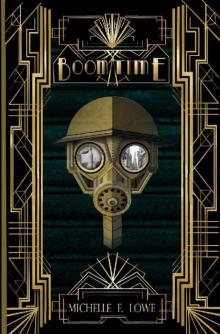 Boom Time
Boom Time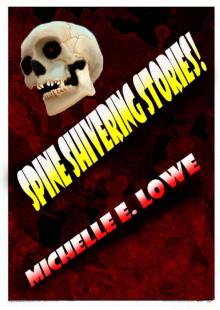 Spine Shivering Stories!
Spine Shivering Stories!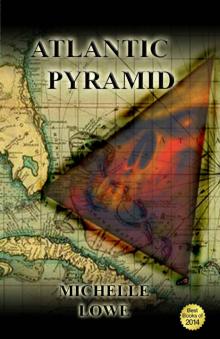 Atlantic Pyramid
Atlantic Pyramid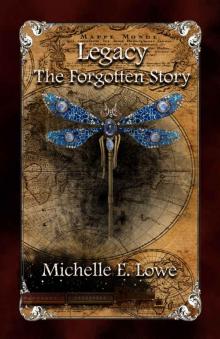 The Forgotten Story
The Forgotten Story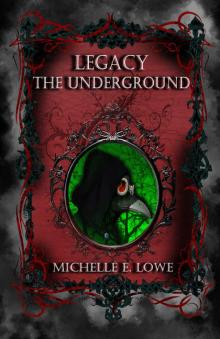 The Underground
The Underground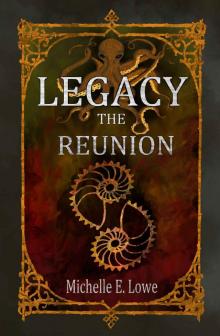 The Reunion
The Reunion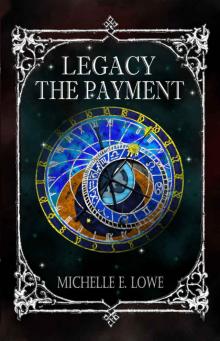 The Payment
The Payment The Warning
The Warning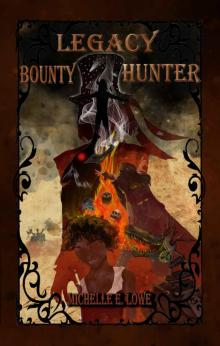 Bounty Hunter
Bounty Hunter